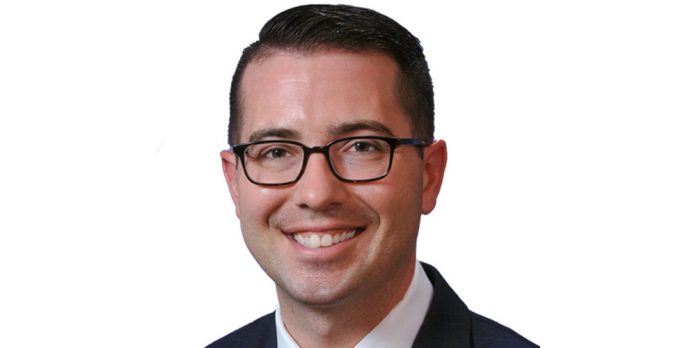Brandt Iden, Head of Government Affairs at Sportradar, shares his views on how states that originally legalized sports betting at the retail level only are now starting to reverse course to include mobile/online wagering. It’s a trend he expects to continue as more numbers point to the dominance of mobile/online wagering in the US market…
SBC: We’re starting to see states like New York and Arkansas reversing course and adding mobile wagering options to existing retail offerings. Do you see this trend continuing with other states, and do you foresee other states starting to adopt mobile wagering from the start?
Brandt Iden: Yes, we’re starting to see both, that more states are taking a second look at their originally enacted legislation, as well as states, which have been debating legislation for the past couple of years, leaning towards integrating mobile wagering into legislation from the onset. This year alone, in addition to New York and Arkansas, Mississippi, North Carolina, and South Dakota have all either filed legislation or are working through their regulatory agencies to enact mobile wagering. Additionally, states like Minnesota, which are dominated by tribal gaming and have been debating sports wagering legislation for years, are now looking to enact mobile wagering from the start. This has been due in part to state lawmakers and regulators who are now realizing that offering mobile wagering provides enhanced consumer protections and helps diminish offshore gaming markets by providing consumers with competitive regulated options.
While the inclusion of mobile wagering may seem like an obvious choice to an outsider, it’s not always that simple. The US is essentially 50+ different countries and each jurisdiction has its own unique gaming landscape and stakeholder dynamic. While some jurisdictions have existing brick-and-mortar casinos, others have no casinos or only a state lottery. Sports betting is the new frontier of gaming, which means it’s up to industry leaders like Sportradar to educate policymakers on the advancements in modern technology that ultimately increase consumer protections and regulatory oversight of the marketplace.
SBC: Of the states that are currently crafting sports betting bills, how are conversations evolving, if at all, in regards to the topic of mobile wagering?
BI: It’s been fantastic to see that the topic of mobile wagering is now the starting point in states without any form of legal sports wagering. This year we are excited about the prospects of sports betting expansion into states like Kansas, Missouri, and Massachusetts, which all offer some form of casino gaming, but have not yet embraced sports wagering.
We’re seeing that policymakers in these states are well aware of the multiple avenues to place wagers, whether it’s across the border in a legal state or through easily accessible offshore websites. It may sound like common sense that mobile wagering enhances consumer protections and brings in additional state revenue, but the complexities surrounding mobile wagering typically focus on one major sticking point: who will have access to a license. Will it be the commercial casinos, tribal casinos, lottery retailers, online operators, bars and restaurants, or professional sports facilities? This is the question that often prolongs the negotiation process and can lead to the legislation being debated over numerous legislative sessions. While it might seem like a never-ending turf battle, there are plenty of examples of states, including Arizona, Louisiana, Illinois, Michigan, Maryland, and Ohio, just to name a few, where the industry has come together to reach an agreement.
SBC: Outside of creating a more convenient experience for consumers, what are some of the other benefits for states legalizing mobile wagering?
BI: There are numerous benefits which come from mobile wagering, but paramount to all others is the ability for the state to implement robust consumer protections. When I originally proposed the legislation in Michigan, it was because I felt that people in my state needed to be protected. With advanced technology like Sportradar’s Integrity Services, all legal bets can be closely monitored in real-time. This intelligence can pick up market irregularities immediately and thus plays an integral role in keeping consumers safe. This information is also a critical component in helping to ensure consumers are betting responsibly. Even though there are some elements of this that exist within a retail environment, it’s much more closely monitored through technology.
Additionally, the absorption of previous offshore sports betting activity into the regulated marketplace is actively promoted and more seamlessly integrated, when a state offers mobile wagering. Absorbing as much betting activity as possible and channeling it underneath the microscope of regulators increases the probability of detecting and thwarting any attempt to fix or otherwise corrupt a sporting event.
SBC: One of the storylines that sometimes gets lost in New York’s recent success is their exorbitant 51% tax rate. Do you believe other states will copy this model in their own legislation?
BI: This is certainly something that I believe the industry should be looking at, because yes, unfortunately, other states are looking at the success in New York and saying, “if they can do it there, we can do it here”. We’ve seen Hawaii recently draft legislation imposing a 55% tax rate and other states in concept discussing a rate of 25%+. While there’s no goal number to strive for, states need to consider the long-term implications of these extraordinarily high tax rates and if they will allow for a competitive market. This ultimately comes back to the issue of consumer protection.
The thinking is, if the tax rates are too high, it will trickle down to the sportsbooks and impact the odds and pricing that they can offer to consumers. If consumers can get considerably better odds at offshore sportsbooks, which aren’t paying taxes, the legal sportsbooks are going to struggle to compete. As an industry, there are going to be lots of issues people disagree on, but as a collective industry, we should all be operating with one common goal: to bring consumers from the illegal betting markets into the regulated, legal market. One of the most effective ways to do this is to keep tax rates reasonable.
SBC: As a former state representative in Michigan who was instrumental in the passage of legalized sports betting, what advice would you give to states going through this process right now?
BI: There is no magic potion to getting legislation over the finish line. However, to any lawmaker who chooses to advance this legislation, I would recommend that they educate themselves as much as possible. Lawmakers should strive to be policy experts on the issue. To that end, I recommend adopting best practices from states that have implanted successful models. Legislation that prioritizes consumer protection, allows for a competitive market, incorporates the distinct dynamics of tribal gaming (if applicable), offers an appropriate tax rate, and has strong supporting policies for responsible gaming measures. Seeking this type of input from industry experts and advancing successful state models will set you up for a legislative victory.














